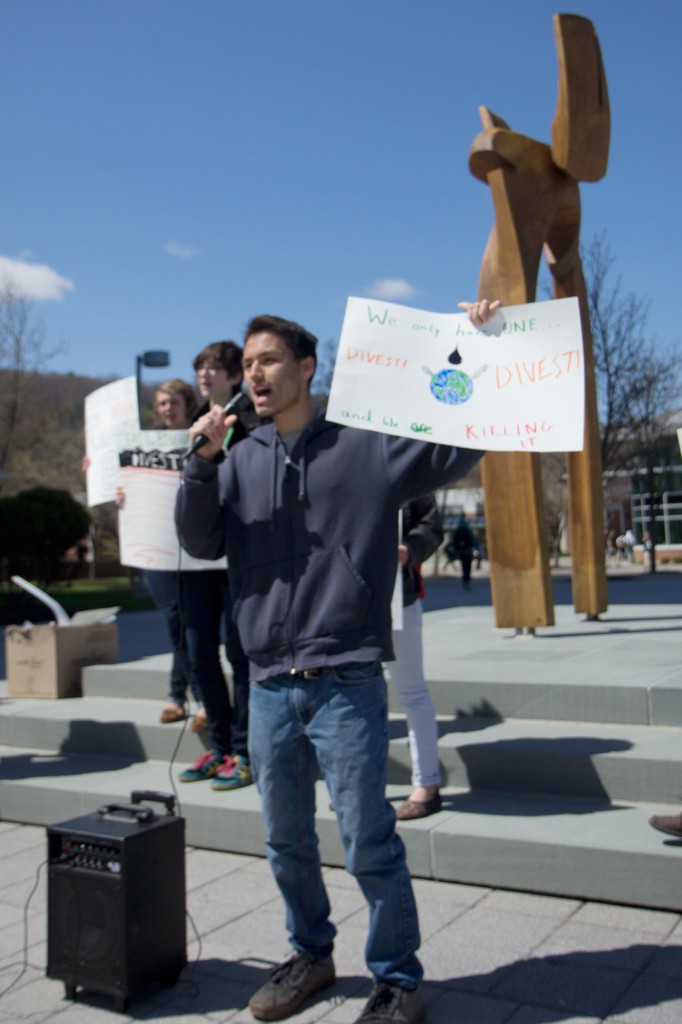
Divest Binghamton, a branch of Intellectual Decisions on Environmental Awareness Solutions (IDEAS), hosted a rally Thursday to raise awareness about the investment policies of the Binghamton Foundation.
The Binghamton Foundation, a not-for-profit corporation, is in charge of managing the University’s $82 million endowment, which includes coordinating charitable donations, scholarships and investments for the fund.
As a separate not-for profit organization, the Binghamton Foundation contends that it is not required to disclose information about its financials, nor respond to Freedom of Information Act requests. The lack of information about exactly where Binghamton money is invested is frustrating for activists like Joseph Morales, the vice president of IDEAS, who want to make sure that the foundation’s money is going toward ethical companies whose philosophies are in line with students’ ideologies.
“There’s a lack of transparency in the BU foundation, they don’t disclose where the money goes, so we don’t know what’s funding our school,” said Morales, a junior majoring in environmental studies. “We don’t know what we’re profiting off of.”
Richard Andrus, an associate professor in the environmental studies department, attended the rally and said that secrecy within the Binghamton Foundation reflects poorly on the University.
“It strikes me that universities should have some kind of ethical standards, and our investment does not,” Andrus said. “Our policy here is to put our money wherever they make the most money, and that’s not an ethical framework. We don’t even know what the investment policy is because it’s a complete secret.”
Sheila Doyle, the associate vice president for external affairs, does not believe that transparency is an issue at the Binghamton Foundation. According to Doyle, the foundation goes through an extensive reporting process once funds are received. Once a donation comes in, the donor recieves an IRS receipt and the funds are placed into accounts that are controlled by the campus and categorized based on restrictions specified by the donor. There are more than 900 accounts where campus departments spend the money and receive monthly reports of activity. These reports are in addition to the annual reports issued to endowment donors on how their funds were invested and spent.
Members of Divest Binghamton find it most troubling that money from the Binghamton Foundation may be going towards investments in the fossil fuels industry, though they are not certain that these investments exist. According to Jacob Robison, another vice president of IDEAS, the foundation leased 600 acres of land to companies for hydrofracking in 2008, citing this as evidence of unsustainable investment practices.
“If they’re willing to lease land to companies with fracking interests, then they are most likely in bed with other fossil fuel interests,” said Robison, a senior majoring in environmental science.
According to Doyle, there are 16 sectors of the fund, which make up approximately 5 percent of the $82 million portfolio, where there may be some connection to fossil fuels.
Isaac Silberman-Gorn, an alumnus who graduated in 2011, is still involved with this cause on campus through his position as an environmental organizer for Citizen Action of New York, an activist organization that also deals with issues of health care and fair elections.
“You have an institution right over there in the administration building that is speaking for students and the community,” Silberman-Gorn said as he motioned to the Couper Administration Building. “I don’t think they are representing the interests of what students actually feel.”
In general, protestors at the rally applauded Binghamton’s overall environmental policies, but were disappointed with the policies of the foundation. Chris Burger, an alumnus from the class of 1985, is the co-founder of the Binghamton Regional Sustainability Coalition and part of a network of other alumni who regularly meet to discuss Binghamton’s green policies.
“[Binghamton University] is doing a lot actually, it’s giving every indication that it understands sustainability,” Burger said. “We ask that they put our money where their mouth is.”
Divest Binghamton has collected around 300 signatures for their petition to divest funds from the fossil fuel industry, putting Binghamton in the company of schools like Harvard, Cornell and Brown, which are also looking into divesting.


